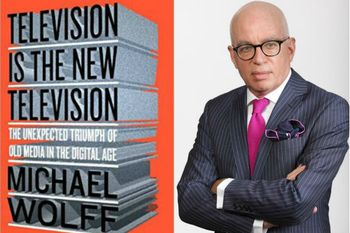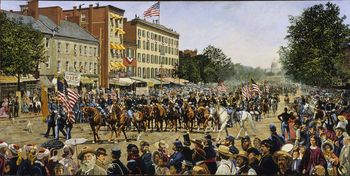
- There is excess, the period during which the crisis becomes evident and the failure of a current Thesis to deal with it becomes obvious.
- There is a Crisis election, in which a leader steps forward whose ideas can defuse the crisis.
- There is the struggle during which people die needlessly, a Trial by Fire in which the stakes are made clear.
- There is Validation, in which the new leader’s thesis is accepted.
History only rhymes. It does not repeat. So it’s not always obvious when a crisis is over, or when validation occurs. In America’s First Crisis, the one the winners called the Civil War, the Battle of Atlanta was followed quickly by the validation of the 1964 election, making the events of Appomattox inevitable.
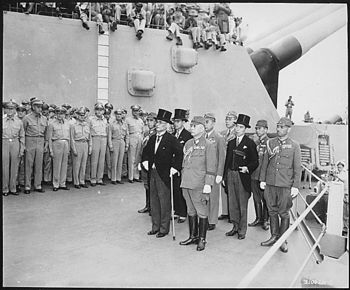
In the 1932 crisis, the actual problem didn’t make itself manifest until late in the decade. World War II represented an historic choice between two ways of dealing with crises, democracy or absolutism, and it wasn’t over for 13 years.
In the 1968 crisis, the problems created around Vietnam festered throughout the 1970s. Jimmy Carter even sought to reverse parts of history’s verdict. Its validation did not come until 1980, with the election of Ronald Reagan, who brought the Nixon Thesis of Conflict to full flower.
The present crisis includes echoes of all this past. As was true during the Civil War, we’re asking deep questions concerning the nature of freedom. As in the Progressive Era, we’re asking basic questions about economic equity. As in the 1930s, freedom and democracy appear to be at stake. And the politics of our time closely mirrors the 1960s, even though the 1968 election is 48 years in the past.
The events of last weekend show we are approaching both the climax, and possible validation, of the present crisis.
That’s a very academic opening to what is now going to be a very angry screed. Because we are all trapped by history. This is our time, as the past belonged to those who lived it, and the future belongs to our grandchildren. I can’t, as a writer, separate myself from current events, as much as I might like to in order to analyze them in a broader context. So let me just state this openly.
The present election will decide whether the past crises meant anything at all.
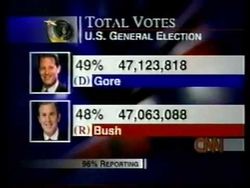
In this election we will nobly save, or meanly lose, the last best hope of Earth. The words of Abraham Lincoln, facing the heart of America’s first crisis, remain true today. We will be remembered in spite of ourselves. The current trial will light us down to the last generation.
The anti-democratic project of the Republican Party has been underway for three decades now, just as the Civil War itself is rooted in the 1830 Nullification crisis. It lies in the deliberate politicization of the judiciary, the branch of government that has decided what the Constitution means since the 1803 decision in Marbury vs. Madison.
T 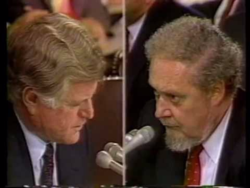
And it was at this point that the ideas behind the project became obvious. The Bush Selection, which halted a democratic counting of the Florida ballots, and installed the oligarchs’ candidate as President, didn’t just lead to Iraq, to Katrina, and to the Great Shitpile. It led to John Roberts, to Samuel Alito, to DC vs Heller, to Citizens United, and to a host of other decisions, large and small, all meant to prevent any future government from aiding its people, and to install the oligarchs as Kings, forever (or until a violent revolution might overthrow them like Louis XVI and the Czars). You let this movement triumph, in restoration will become impossible. Only violence, the destruction of America, will make any rule by its people possible. And such a revolution, as in France and in Russia, will not result in the popular rule it will promise.

One statement in the South Carolina Republican debate stood out for me. It came from Marco Rubio, allegedly the “moderate” of the group, because he’s young and portrays himself as moderate. It was a statement on behalf of Scalia-ism. Is this a moderate statement? “The Constitution is dead.”
Really? The Constitution should be interpreted based only on its meaning in 1788? Women did not vote in 1788, and black people were slaves. Only white property owners had the franchise, and power was strictly rationed in order to maintain this into the future.
It was Abraham Lincoln who created today’s America, not James Madison. In the Gettysburg Address, he deliberately moved our founding year from 1789, when the Constitution came into force, to July 4, 1776, to the Declaration of Independence. These sentiments are not in Marco Rubio’s conception of the Constitution. “We hold these truths to be self-evident, that all men are created equal. That they are endowed by their creator with certain inalienable rights. That among these are life, liberty, and the pursuit of happiness.”
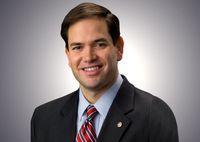
It’s ironic that Rubio is Hispanic, because what his party is proposing is essentially a Mexican conception, a dictatorship combining the power of the clergy, the police, and economic oligarchs. How has that worked out for the Mexican people? How did Bautista’s fascism work out for the Cuban people?
These are the stakes in the 2016 election. It is a blessing that, for Americans, the crisis has not yet involved the mass shedding of American blood – although the people of Iraq, Afghanistan, Libya and Syria have not been so fortunate. Do we still believe in what our forefathers told the world, that our goal is a “more perfect union,” not perfect, but “more perfect,” never achieving perfection, but always striving for a little more, with each passing year. More ordered liberty. More prosperity. More progress. More.
Antonin Scalia was the Robert E. Lee of the Oligarchy. He was its leading general, its chief advocate, it’s most powerful leader. Barack Obama, I believe, is the Abraham Lincoln of his time. His eloquence, his calm pursuit of real change, and his call on all of us to obey the “better angels of our nature” mark him as a great President.
But both are now off the stage. Death took Scalia. Term limits are removing Obama. Whose path will “We, the People” choose to follow now?
We will know on November 9.


